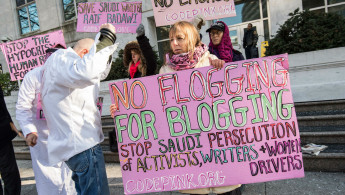Raif Bedawi: Profile of a jailed Saudi blogger
The co-founder of the Saudi Liberal Network internet discussion group has been sentenced to 1,000 lashes, ten years in prison and a fine of around $270,000.
The first of 20 sets of 50 lashes was carried out on January 9, outside a mosque in the Red Sea city of Jeddah.
The second set has been postponed at least 12 times, mainly due to Bedawi's ill-health. He has hypertension and diabetes, and his health has deteriorated since the first flogging.
The Saudi writer and activist was arrested in 2012, and brought to court on several charges including insulting Islam using electronic channels, and apostasy - which carries an automatic death sentence.
A judge also ordered his website to be shut down for criticising Saudi Arabia's religious police.
In 2013, he was sentenced to seven years in prison and 600 lashes.
His sentence was extended in 2014, and, in mid-January 2015, it was passed to the Saudi Supreme Court for review.
Born in 1984, Bedawi is married to Ensaf Haidar and they have three children. His family are currently living in Canada, where they moved after receiving death threats.
He was first detained on apostasy charge in 2008, and later banned from leaving the country in 2009.
In 2012, Amnesty International designated him a prisoner of conscience.
Bedawi has been given several international awards, including the Courage Award 2015 from the Geneva Summit for Human Rights and Democracy, and he is a nominee for the 2015 Nobel Peace Prize.
International condemnation
| Bedawi's sentence is widely regarded as an infringement of international law. |
There has been worldwide outrage over Bedawi's sentence, including from the UN, United States, Europe and Canada, and the sentence is widely regarded as an infringement of international law.
In a review of Saudi Arabia's membership of the UN Human Rights Council, Human Rights Watch accused the kingdom of having "harassed, investigated, prosecuted, and jailed prominent peaceful dissidents and human rights activists on vague charges".
Amnesty International Canada also criticised Saudi authorities for pursuing "a relentless campaign of repression in the name of security" since March 2011.
"Those who express dissent face arrest and imprisonment whether they are critics, bloggers, activists or academics," said the organisation. "Raif Badawi is just one of many."
Human Rights Watch said that, as a member of the UN's Human Rights Council, Saudi Arabia was "expected to uphold the highest standards in the promotion and protection of human rights".
The Gulf state ratified the Convention against Torture and Other Cruel, Inhuman or Degrading Treatment or Punishment in 1997.
It has also ratified the Arab Charter on Human Rights, which guarantees the right to freedom of opinion and expression under article 32.
Twitter has been exploding with those criticising Bedawi's sentence.
"I do not understand how a country that claims to respect other religions can imprison someone just for expressing a different opinion. Imagine what they would've done to him if he followed another religion!" tweeted Faisal Alqarny.
Saudi reaction
The Saudi foreign ministry has denounced statements issued by other countries and organisations on the Badawi case.
"The Saudi judiciary is independent, and Saudi Arabia will not allow any intervention in its judiciary or internal affairs", a source told the Saudi Okaz newspaper.
The Saudi embassy in Brussels sent an official statement on behalf of the Saudi foreign affairs ministry to members of the European parliament on 29 May, which condemned any "interference in its internal affairs", saying that "some international parties and media… drifted into an attempt to infringe and attack on the sovereign right of states."
Joe Stork, deputy Middle East director at Human Rights Watch, said such posturing was a distraction.
"Saudi authorities believe they are the ones under attack, while Raif Badawi waits to be publicly flogged merely for expressing his peaceful opinions," he said.
Cracking down on activists
Bedawi's sentence is the latest in a series of harsh penalties handed out to Saudi human rights activists.
His lawyer, Waleed Abu al-Khair, was sentenced to 15 years in prison in July 2014 for criticising Saudi human rights abuses in media interviews and on social media. He had also set up an organisation to monitor human rights in Saudi Arabia.
Activist and blogger Fadhil al-Manasif was given a 14-year prison sentence for charges that included helping international journalists covering the treatment of Shia Muslims by the Sunni majority in the kingdom's eastern province from 2011-12.
"The cruel and unjust treatment of Badawi is sadly just one piece of a broader crackdown on peaceful dissent in Saudi Arabia," said Stork.



